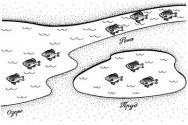Who were the main characters in the drama the robbers. “Do modern readers need classical literature? Romantic tragedy by F. Schiller “The Robbers”
I devote two lessons to working on the play, the third is a general lesson-reflection. In the first lessons, there is detailed work on the text of the play, reading by role.
In preparation for the final lesson, the children were divided into creative groups with assignments: the “Actors” group prepared the third scene of the second act “Bohemian Forests” for staging; the group “Design Artists” prepared a poster for the play, portraits of the main characters - Franz Moor and Karl Moor; the “Researchers” group worked on A. S. Pushkin’s novel “Dubrovsky”; The “Art Critics” group worked on the history of the creation of L. V. Beethoven’s 9th Symphony.
Decor: Theater screen, portrait of the writer, poster for the drama, illustrations for the work.
Musical accompaniment: L. V. Beethoven. 9th Symphony, Ode “To Joy”.
Epigraph:“I can truly cause amazement” (Karl Moor).
Teacher's opening speech
In previous lessons, we introduced you to the famous classical drama of the German poet and playwright Friedrich Schiller (1759–1805) “The Robbers,” a writer whom A. S. Pushkin ranked with the greatest figures of various eras - Homer, Dante, Shakespeare, Racine . Today the last page of the play has been turned, so there is an impromptu curtain in the classroom, since the conversation will not just be about literary work, but about drama, where the art of words and theater is fused together. “Let's talk about the stormy days of the Caucasus, about Schiller, about glory, about love,” we will say after A.S. Pushkin.
Today's lesson is a reflection lesson on what you read. We will try to answer the questions: How did we, 8th grade students, understand the pages of this great work? Do we need Schiller's plays in modern times or have they become deep history? What is a classic? classic? What feelings did it make you feel? main character plays?
Conversation with the class
The action of the play "The Robbers" takes place in Germany in the 18th century. Its plot is based on the enmity of two brothers. What can you say about the main characters of the play?
Student answers
The main characters are brothers Karl and Franz Moor. One of them is the younger brother Franz - a heartless, hypocritical, low man. He does everything to discredit his older brother in the eyes of his father, Count von Moor. The treacherous, despotic, ugly-looking Franz pursues only one goal - power and money.
Another - noble, fiery, heroic, daring Karl Moor, by the will of fate, turned out to be the leader of a gang of robbers.
Which artistic device underlies the construction of the brothers' characters? Justify this.
When characterizing characters, Schiller uses the technique Antitheses. The brothers' appearance, their inner world, and their actions are contrasting.
One hypocritically pretends to be meek and loving son, although in fact he is ready for meanness in order to discredit Karl. The other is generous, capable of sublime feelings. Antonyms are used to describe the brothers: vile - generous, unscrupulous - honest, immoral - noble.
Look at the portraits of these heroes made by the group "Artists". How do you think they managed to convey the main character traits of the characters? Support your answers with quotes from the text. (Extended student answers.)
“Who now dares to come and hold me accountable or say to my face: “You’re a scoundrel!” Now away with the painful mask of meekness and virtue! Look at the real Franz and be horrified!.. Stroking and caressing is not in my customs. The pallor of poverty and slavish fear is the color of my livery. I will dress you in this livery!” (Characterization of Franz; act 2, scene 2.)
“Amalia. Faded colors cannot replicate the high spirit that shone in his fiery eyes...
Old Man Moore. This friendly, affectionate gaze.” (Characterization of Karl; act 2, scene 2.)
Teacher. As a result of Franz's intrigue, Karl Moor becomes a criminal, his desire for freedom turns into hatred of all humanity as a whole. Wanting to restore justice and take revenge on his brother, Karl becomes the leader of a gang of robbers. However, the life of robbers is far from the ideal of a “moral world order.” One of the key scenes of the play is the scene in the Bohemian forests. Let us turn to a fragment of the 2nd scene of the 3rd act.
Group "Actors" presents a fragment of this scene from the words of the priest: “So this is the dragon’s lair! With your permission, my sirs, I am a minister of the church, and there are one thousand seven hundred people standing over there, protecting every hair on my head...” until Moor’s words: “Now we are free, friends...”
Conversation with the class
Why is a priest brought into the camp of robbers?
Answer. The playwright takes his hero through a test of conscience.
What better helps us understand the character of the main character?
Answer. Schiller in “The Robbers” managed to show the most intimate movements of the soul through the hero’s monologues and remarks. Karl Moor's monologues help us understand the internally contradictory path from hatred and revenge to awareness of the horror of death and repentance the hero goes through. He takes upon himself the right to execute and pardon, but the atrocities and outrages of the robbers do not give him the opportunity to become the same. The hero's monologue shows how deeply he experiences a discord with his conscience.
“Moor. How do you know that I don’t have terrible dreams at night, that I won’t turn pale on my deathbed? How many things have you had to do for which you were responsible? Know, ambitious young man: laurels are not green for murderers and arsonists! It is not glory that meets robber victories, but curses, dangers, death, shame!”
Teacher."The Robbers" is a rebellious drama, and its hero is noble robber. What a rich topic! Schiller was not the first to discover it, and in Russian literature it found a continuation in A. S. Pushkin’s novel “Dubrovsky”. I suggested comparing the hero of Schiller’s play with the famous hero Vladimir Dubrovsky to a group of literary critics.
What can you say about the life goals of these heroes? What qualities of the characters resonate with you?
Response from the Research Group. The theme of rebellion and the noble robber is presented in A. S. Pushkin’s novel “Dubrovsky,” written in 1832–1833. Vladimir Dubrovsky, a Russian nobleman, fueled by a sense of revenge for the insult and death of his father, is forced to burn the family estate and go into the forest as the leader of the robbers. The scene in the Bohemian forests resembles a scene from Chapter XIX: “In the middle of a dense forest, on a narrow lawn, stood a small earthen fortification, consisting of a rampart and a ditch, behind which there were several huts and dugouts... The robbers each took a specific place. At this time, three watchmen ran to the gate. Dubrovsky went to meet them. "What's happened?" - he asked them. “Soldiers are in the forest,” they answered, “they are surrounding us.”
Dubrovsky and Karl Moor are united by similar destinies. Karl does not kill for robbery, but distributes his rightful share of the spoils to orphans. The characteristic that applies to both of them is - Noble. The actions of Vladimir Dubrovsky, his desire for revenge and refusal of it coincide with the path of Schiller’s hero, only he, unlike Vladimir, surrenders to justice, and does not hide abroad. Considering these images of world literature, we see similarities in the depiction of the rebel hero in Pushkin and Schiller. Nobility, honesty, and generosity unite these heroes. Their inner world and character are incompatible with the environment (a gang of robbers) into which they both find themselves: “I am not a thief, tell them that my craft is retribution, my trade is revenge” (Karl Moor).
Teacher. For two hundred years now, the ending of the play has been interpreted in different ways. Invariably stands before us main question final:
Why did its main character condemn himself? Why is he surrendering to justice?
Based on the analysis of the last act, the guys show the main character’s awareness of the disastrousness of his path and the desire for retribution for himself for the death of Amalia, father and brother. A person is responsible for his actions both to himself and to society: “Oh, I am a fool who dreamed of correcting the world with atrocities and upholding laws with lawlessness! I called it vengeance and right!.. What I ruined is ruined. Never restore the defeated! But I can still pacify the desecrated laws, heal the wounded world...” With bitterness and shame, Karl Moor admitted that he had taken the wrong path. He tried to restore justice in the world with his sword, but he good intentions accompanied by dishonorable atrocities.
Why did we make the words of Karl Moor “Yes, I really can cause amazement” as an epigraph to the lesson?
Did the main character surprise you? How do you feel about his action? (Students' answers.)
Teacher. F. Schiller remains popular in Russia in the 21st century, just as he was popular in the 19th century. His plays do not leave the stages of Russian theaters: the Moscow Theater named after A.S. Pushkin, Maly, BDT and others. Viewers and readers of our time continue to search for the answer to the question: is it possible to remain human without repentance? The action of the main character of the play, Karl Moor, continues to cause controversy and judgment to this day, some of which were presented in our lesson. The great poet’s thoughts about the extent of a person’s responsibility for his actions were close to the great Russian writers of the 19th century (for example, A. S. Pushkin and F. M. Dostoevsky).
The description of events in the novels and other works of the great German poet did not go unnoticed by musicians.
Group "Art Critics". In 1824, already seriously ill, Beethoven wrote his last - the 9th symphony. It was a song of freedom, a fiery appeal addressed to descendants. The final part of the symphony sounded especially solemn. The composer set the music to the words of Schiller's ode "To Joy". In unison great composer And great poet called on everyone: “Hug, millions!” (Expressive reading of an ode to students.)
Joy, unearthly flame,
The heavenly spirit that has flown to us
Intoxicated by you
We entered your bright temple.
You bring us closer without effort
All separated by enmity,
Where you spread your wings
People are brothers among themselves.
Hug, millions!
Join in the joy of one!
(Beethoven’s 9th Symphony, Ode “To Joy,” plays.)
Compare Schiller's ode-song with his "The Robbers". Could the characters in the drama accept it? (Students' answers.)
Final words from the teacher. Years pass, directors' interpretations and actors' costumes change, certain accents shift, but the fiery pathos of the tragedy remains unchanged. Schiller and his hero continue to passionately appeal to human conscience, and readers and viewers continue to search for truth to this day.
Homework. Write a short essay-reflection on the topic “Why is F. Schiller’s drama “The Robbers” close to the modern reader?”
Literature History of German literature: In 3 volumes. M.: Raduga, 1985. Vol. 1. Libenzon Z. E. Friedrich Schiller. M.: Education, 1990. Materials from I. Arkin’s lessons: Literature at school, 1998.
Composition
Classics form the basis school curriculum on literature. Students study works from the distant 18th, 19th, and 20th centuries. Often these works tell about events or phenomena that are unfamiliar and incomprehensible modern child, yes in general to modern man. Thus, almost all works of the early 20th century are dedicated to the revolution of 1917 and civil war, the epic novel by L. N. Tolstoy tells about life during the period Patriotic War 1812, and “The Tale of Igor’s Campaign” is about internecine warriors and the fight against nomads in the distant 12th century.
So is it necessary? classic literature to the modern reader? What can she give, what can she teach? Maybe it’s worth reading only works that talk about life today?
To answer these questions, first, it seems to me, you need to figure out what “classical literature” is? Why are a certain number of works united under this name? Why is it considered that every educated person must read and know classical literature?
To my great surprise, none of the dictionaries could give a clear definition of the concept that interests us. Only one thing is clear - “classical literature” is trying to understand timeless things, eternal values, which are relevant at all times. That's why I think it's so valuable. But then another question arises: why is the opinion of these particular writers considered exemplary and correct? Why can they, and not other people who worked at this time, teach us, people of the 21st century, something?
Probably, it was the “classical” writers who most accurately answered many of the questions that worried humanity at all times. It was they who gave a subtle analysis of human nature, psychology, and were able to formulate the basic “laws” by which man has always existed.
Probably my favorite “classic” is F. M. Dostoevsky. His novel “The Brothers Karamazov,” in my opinion, is a universal work that provides answers to eternal questions that sooner or later arise in every person’s head.
At the center of the story are the fates of four brothers. Their lives are closely connected with each other and with the life of their father - a despotic, depraved, sinful man in the broadest sense of the word.
The Brothers Karamazov are extremely different people. Each of them, living in difficult conditions of despotism and tyranny of their father, tries to find answers to important questions being. And it seems to them that they find this idea.
So, Ivan Karamazov puts reason and logic at the basis of the angle. He tries to rationally understand and justify what is happening around him. However, the hero does this poorly. Ivan cannot comprehend much, cannot accept a cruel and unfair world.
It’s hard for this hero to live in the world, he tries to find something that would make his existence easier, but he doesn’t find such a saving outlet. His destiny is hopelessness and despair.
Another brother, Smerdyakov, lives in constant hatred. This man hates everything - his father, brothers, people, Russia, himself, in the end. Smerdyakov comes to the conclusion that one must live, allowing oneself everything. He refuses all moral and moral laws within himself and strives for self-destruction.
The elder brother Mitya Karamazov may not have clearly formulated his position in life. He lives as “God puts it on his soul,” following the call of his nature - broad, riotous, passionate and unrestrained. “He’s a broad man, too broad,” says Mitya, as if talking about himself. This hero has powerful vital forces, but does not know how to use them to be happy himself and to make those around him happy.
The most harmonious among the brothers is Alyosha Karamazov. He has the most valuable ability - to believe. It is faith in God that makes Alyosha a bright person, able to cope with his dark sides and give people light. From the monastery Alyosha took away an all-forgiving love for people and humility - something that, according to Dostoevsky, people lack at all times.
But in the harsh, unfair and contradictory world in which the brothers live, no one hears Alyosha’s weak voice. Everyone is busy with themselves, their grievances and passions. One gets the feeling that each of the heroes is fighting face to face with fate, which, in any case, will prevail and break the heroes.
The Karamazovs' way of life and thought leads them to tragedy. And this tragedy happens - Smerdyakov kills his father. However, everyone is involved in this crime - Ivan came up with the terrible idea, and Mitya pays for it with hard labor. Thus, Dostoevsky argues that there are no innocent people in the crimes committed in the world. Everyone is spiritually to blame for what is happening. This is one of the main ideas in the novel The Brothers Karamazov.
One of the greatest philosophers of the early 20th century, V. Rozanov, described it this way: life position Dostoevsky: “Dostoevsky does not want universal happiness in the future, he does not want this future to justify the present. He demands a different justification and would rather bang his head against the wall until exhaustion than rest on a humane ideal.”
The writer believes that abstract thoughts about a wonderful future are criminal. While people philosophize about what will happen tomorrow, evil is happening in the world today. Every person should live here and now, striving to make sure that real life became more humane and kinder. Everyone knows the words of Dostoevsky that no wonderful future is worth one single tear of a child in the present.
By showing the life of the Karamazov family, the author once again strives to convey to the reader that it is necessary to change the everyday life around you. And only moral purification can change the world, which, according to the writer, occurs only through suffering. It is on this path that Dostoevsky directs Mitya Karamazov, seeing in him enormous human potential.
Thus, I hope I have answered the question I posed at the beginning. I believe that classical literature is literature for all times. It should become the basis, the base that shapes a person, his inner world, moral views. This is why classical literature is studied in school. That is why, in my opinion, every person who claims to be a Human should read and re-read it.
F. M. is one of the most famous Russian thinkers and writers in the world. His outstanding works were loved not only by readers of the 19th century, they are no less loved and read in our time. His work has overcome many decades and remains interesting to the modern reader, and the problems that F.M. touched upon are still relevant today, which arouses even greater interest in this outstanding personality and his works.
No one will argue what is most famous work F. M. Dostoevsky - novel “Crime and Punishment”. However, the novel “White Nights” is rightfully considered the most poetic. It details the relationship of someone who fell unrequitedly in love with main character Nastenka is a man who, without counting on reciprocal feelings, helps a girl find her happiness with another person - with the one whom Nastenka sincerely loves.
This novel allows us to conclude that the feelings and thoughts of F. M. Dostoevsky, embodied in his works, including the novel “White Nights,” are unique and unique. I am sure that the originality of the plots, the wide variety of problems for which the writer seeks solutions in his works, his attitudes and thoughts towards these problems will always remain interesting to readers.
Undoubtedly, everyone has their own opinion about certain problems, but each of us can find something interesting in the works of F. M. Dostoevsky for ourselves. It is known that the great Russian philosopher and writer considered Jesus Christ to be his ideal. And no one can blame him for this, because this is his own decision and his choice, and the writer did not impose his worldview, his thoughts and feelings on anyone.
F.M. simply talks about the people who lived in his world. Therefore, everyone, young and old, believers and non-believers, is interested in reading his novels and recognizing their contemporaries in their heroes. In the darkest corners of St. Petersburg, you can always find a poor dreamer who is hiding from the sun and poverty, feeling guilty about everything, embarrassed, with stupid speech, with ridiculous manners, reaching the point of self-destruction. The author creates a generalized portrait of such a dreamer: “A crumpled, filthy kitten who, snorting, with resentment and at the same time hostility, looks at nature and even at the handout from the master’s dinner brought by the compassionate housekeeper.”
Great connoisseur human soul, F.M. describes the characters of the heroes of his works with great skill. For example, in the novel “White Nights” he managed to fully reveal the images of the main characters of the work through their monologues. Despite the fact that the author did not give specific characteristics, we received complete portraits of the characters, assembling them from pieces of the mosaic, each of which is a masterfully polished detail of the novel, separated from everything superfluous.
For his works, F.M. chose wonderful subjects that made his books unforgettable and unique. All the events that take place in them seem as real and reliable as possible, and the ending of these works can never be predicted.
The skill and psychologism of F. M. Dostoevsky, the diversity of characters and plots, individuality, unpredictability and authenticity - all this makes the thoughts and feelings of the outstanding Russian writer, reflected in his works, interesting to modern readers.
“The Robbers” was completed in 1781. Schiller had just completed a course at the Military Academy in Stuttgart, and wrote the drama while still studying there. The young writer had to publish the drama at his own expense, because not a single publisher in Stuttgart wanted to publish it.
But the director of the Mainham Theater, Baron von Dahlberg, undertook to stage it. The premiere took place in Mainheim in 1882. Schiller immediately became famous.
Genre and direction
Young Schiller is an ideological follower of Sturm und Drang, an association close to sentimentalism. The participants of Sturm and Drang carried an educational ideology on German soil. The works of Rousseau, especially his literary work, are very important for Schiller. "The Thieves" reflects the idea of "natural man", the rejection of modern civilization and doubts about progress. Schiller shared Rousseau's religious concept (one of the qualities negative hero Franz Moor - godlessness). Schiller puts Rousseau's ideas into the mouths of his heroes.
The genre of the work “Robbers” is drama. In the finale, all of Karl’s loved ones die, and he himself goes to surrender to the authorities. The contradictions in his life are insoluble. He is broken morally and expects physical retribution. Some researchers specify the genre, calling the work a robber drama.
Topics and problems
The theme of the drama is enmity and hatred between loved ones, which can kill; a person’s responsibility for his choices and his actions, for his moral obligations.
The main idea is pronounced by the priest: there is no greater sin than parricide and fratricide. Karl echoes him in the finale: “Oh, I am a fool who dreamed of correcting the world with atrocities and upholding laws with iniquities!”
In the preface, Schiller admits that his goal as a playwright is “to spy on the innermost movements of the soul.” The problems raised in the drama are human passions: revenge and betrayal, slander of the eldest son, the grief of a deceived father, Amalia's choice, the loyalty of the robbers and Karl to his word.
Social problems are associated with the omnipotence of feudal lords (the story of Kosinsky, whose beloved became the mistress of the prince, and he took away Kosinsky's lands and gave them to the minister). One of the epigraphs of the drama is “On tyrants.”
Women in the drama make a choice between honor and love. Amalia (Kosinski's fiancée) chooses love (while losing her lover). And Karl saves his Amalia from such a choice by returning home on time.
Plot and composition
The plot was borrowed by Schiller from Schubart’s story “On the History of the Human Heart.” The plot was influenced by stories of noble bandits fighting against feudal lords. Robbery was a common social phenomenon of Schiller's time.
The younger son Franz slandered the elder Karl in the eyes of his father, and then declared him dead. He wanted to inherit his father's wealth and marry his brother's fiancee. He declared his sick father dead and locked him in the family crypt.
Karl, a noble robber, but also a murderer, feeling worried about his bride, decides to secretly sneak into the family castle. He finds his father barely alive, having spent 3 months in the crypt, and Amalia still loving him. Karl wants to take revenge on his brother for his father’s suffering, but he strangles himself with a cord. The father dies after learning that Karl is a robber, and Amalia asks to stab her, so as not to part with him again. Karl fulfills Amalia's request and is brought into the hands of justice, simultaneously doing a good deed for the father of 11 children.
Heroes and images
Old Man Moore wants only one thing: for his children to love each other. He is too soft, which Franz takes advantage of and pulls out of his mouth a curse directed at Karl. It was the father's refusal to accept his son in his castle that prompted Charles to become a robber. The father either curses his son or calls him a pearl in the crown of the Almighty and an angel. The old man is not ready to accept his son Karl as a robber and murderer, and dies from this news.
Franz Moor, the youngest son, is treacherous and deceitful. His goal is to take possession of his father's estate. In his own words, he was mired in all mortal sins. Franz suspects that all people are like him. Franz considers a person to be dirt, and he himself is completely devoid of conscience.
The priest calls Franz a tyrant. Franz is an atheist, but deep down he is afraid of meeting God. He is tormented by the sin of parricide, which is reflected in a dream about Last Judgment. His death is correlated with his sins: he hanged himself, like Judas.
The older brother Karl Moor is a noble robber. He himself does not consider himself either a criminal or a thief, calling retribution his craft, and revenge his trade.
Karl is devout, but treats churchmen with contempt, calling them Pharisees, interpreters of the truth, monkeys of the deity.
Karl, according to the priest, is consumed by pride. Indeed, Karl treats the robbers with contempt, calling them godless scoundrels and instruments of his great plans.
Karl is a natural man who acts according to common sense. Having learned about his brother’s treachery, Karl is ready to flee so as not to kill him in anger. He is generous and generous, giving Daniel a wallet. At the end of the tragedy, Karl decides not only to surrender to the authorities, but also to help the poor man by giving him money for his capture.
Moreover, Karl is a robber and murderer. He would like to forget the screams of his victims, trying to find justification for his actions in his pedigree and his upbringing.
Karl has a keen sense of justice. He himself rebels against human laws, considering them unjust, but is outraged that Franz violates God's laws when he kills and tortures his father: “The laws of the universe have been turned into dice! The connection of nature fell apart... The son killed his father.”
From Karl's point of view, revenge justifies his robbery and murder of his brother. And yet he does not consider himself entitled to be happy and love if he has killed so many.
Daniel, a seventy-year-old servant, is exceptionally honest. He does not console Franz, who told him a terrible dream about the Last Judgment, but only promises to pray for him. Franz calls this sincerity the wisdom and cowardice of the mob. Daniel refuses to stab Franz when the hour of retribution approaches, not wanting to commit a sin.
Images of robbers
They are loyal to their chieftain and do not agree to hand him over to the authorities even for a signed pardon. Karl calls the robbers punishing angels. His obligations to them force Karl to kill Amalia.
Amalia
The girl is faithful to her lover and idealizes him. Amalia is ready to go to the monastery, having learned about the imaginary death of Karl and his father, but does not agree to become Franz’s wife, she wants to stab herself when her younger brother harasses her with force.
Amalia cannot imagine her life without her lover. When a girl finds out that her fiancé is a robber, she calls him both a demon and an angel. She herself becomes a victim of her lover's debt.
Conflict
The conflict in drama is external and internal. External social conflict: rebellion against feudal tyranny. He encourages Karl to become a robber, and Franz to plot intrigues against his father and brother. At the end of the novel, the conflict is resolved by Karl admitting the error of his ways.
Internal conflict Karla is a contradiction between the right to protest and criminal ways of realizing it, based on violence. This conflict is insoluble.
Internal conflict is inherent in every hero. Amalia resolves the conflict between her love for Karl and her sympathy for Karl in disguise. Franz's internal conflict is the question of the existence of God. The father cannot decide whether to forgive or curse each of his sons.
Artistic originality
For the young Schiller, the main thing in drama is to convey his ideas to the reader and viewer. The plot is not based on facts of life, but comes from ideas. The character of Schiller's hero is conventional. He builds it rationally, based on his meager knowledge about society and the world, and subordinates it to an idea.
Schiller created a new type of drama. It has a political component, pathos, emotionality and lyricism.
Songs are of great importance in drama. Karl and Amalia sing, restoring their strength by playing the lute and pouring out their melancholy. The songs reveal the true feelings of the characters, for example, Charles sings about Caesar and the traitor Brutus, having learned about his brother’s betrayal.








